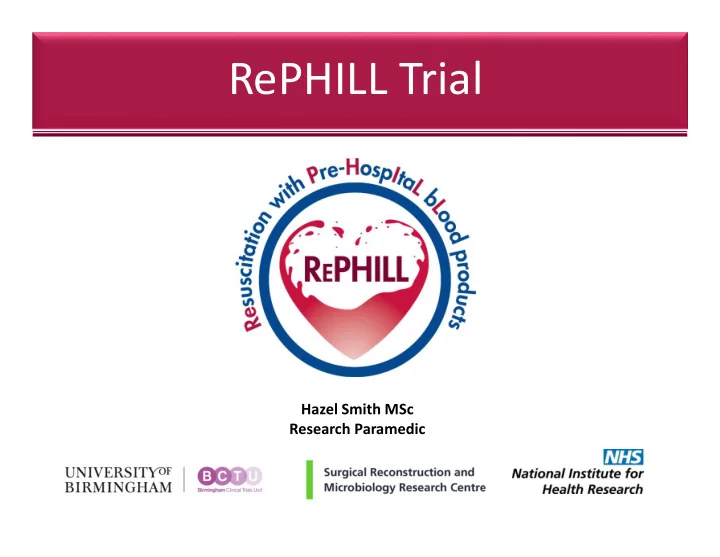

RePHILL Trial RePHILL Hazel Smith MSc Research Paramedic
RePHILL RePHILL A Multi-Centre Randomised Controlled Trial of Pre-Hospital Blood Product Administration versus Standard Care for Traumatic Haemorrhage “Resuscitation with Pre-HospItaL BLood Products (PHBP)” Protocol Version: 2.0, 16 th January 2017
RePHILL RePHILL • Sponsor: University Hospitals Birmingham NHS Foundation Trust • Funding: NIHR Efficacy & Mechanism Evaluation Programme (project number 14/152/14)
RePHILL RePHILL • Target number of patients nationally: 490 • Length of recruitment: 3 ½ years • Length of follow-up: main trial data collection ends at death, hospital discharge or at 30 days follow-up , whichever occurs first • Study funding duration: 4 years
Jan 2018 RePHILL • 4 Blood Banks – New X, UHCW, Addenbrooke’s and Norfolk and Norwich • 4 Air Ambulances – MAA, TAAS, MAGPAS and EAAA • 8 Acute Trusts – UHB, UHCW, Addenbrooke’s, Norfolk and Norwich, UHNM, Southmead, Notts QMC and Sheffield
Rationale It is routine practice to give patients who have suffered major traumatic haemorrhage, blood products (blood and plasma) in hospital but there is insufficient good- quality evidence to support the use of blood products during resuscitation in a pre-hospital setting.
Primary objective Investigate the clinical effectiveness of pre-hospital blood product (PHBP) resuscitation compared to the current standard care of restricted crystalloid-based resuscitation (standard care) in patients suffering from major traumatic haemorrhage.
Secondary objectives • When compared to standard care, does PHBP resuscitation: - Improve blood pressure, heart rate and capillary oxygenation on ED arrival? - Prolong on-scene time? - Reduce pre-hospital fluid requirements? - Reduce in-hospital transfusion requirements? - Reduce trauma-induced coagulopathy? - Preserve platelet function? - Lead to a greater incidence of transfusion-related complications? - Lead to blood product wastage?
Summary
Inclusion criteria • Traumatic injury • Pre-Hospital Emergency Medical (PHEM) team attend • Hypotension (defined criteria)
Exclusion criteria • Children (known or apparently <16 y.o.) • Blood administered on-scene prior to randomisation • Refusal of blood product administration (e.g. known Jehovah’s Witness) • Pregnancy (known or apparent) • Isolated head injury without evidence of external haemorrhage • Known prisoners in the custody of HM Prison or Probation services
How? RePHILL
Standard care arm Up to 4 boluses of 250mL sodium chloride 0.9% (normal saline), given sequentially.
PHBP arm Up to 2 units of packed red blood cells (PRBC) and up to 2 units of lyophilised plasma (LyoPlas) given in the following order: 1 unit 1 unit 1 unit 1 unit PRBC LyoPlas PRBC LyoPlas
LyoPlas • Manufactured by the German Red Cross (DRK) • Freeze-dried plasma derived from a single donation • Used in the same indication as FFP • Can be stored between +2 and +25 ˚C • Shelf life of 15 months • Classed as a prescription-only medication in Germany
Pharmacies receive Blood banks store and PHEM teams attend LyoPlas and supply pack LyoPlas, PRBC or patient on-scene, deliver to the blood banks saline into transport intervention and transfer and maintain boxes and supply to patient to the receiving oversight PHEM teams hospital throughout the trial Receiving hospitals provide further treatment, obtain consent and complete follow-up for the patient
Primary outcome The primary outcome is a composite measure consisting of: 1) Episode mortality 2) Lactate clearance. A failure to achieve lactate clearance on ≥ 20% per hour in the first 2 hours after randomisation
Secondary outcomes • Individual components of the primary outcome • All cause mortality within 3 hours of randomisation • Pre-hospital fluid type and volume • Vital signs at scene, on arrival at ED, then also at 2, 6 & 24 hours • Trauma-induced coagulopathy • Coagulation measured viscoelasticity by rotational thromboelastometry (ROTEM) • Platelet function using electrode impedance aggregometry (Multiplate)
Key consideration • Patient consent – Major traumatic haemorrhage is a life-threatening condition that requires urgent treatment – Majority of patients will lack capacity throughout recruitment and intervention periods – Clinically unjustifiable to delay treatment until fully informed consent can be obtained Consequently, RePHILL cannot be conducted on the basis of prospective informed consent
Monitoring and audit Trial Steering Committee Independent supervision of the trial, including recruitment rates, compliance with trial drug, withdrawal, follow-up etc. Data Monitoring Committee Is the trial safe? Has a clear result been reached? Inspections from MHRA and/or audits from Trust R&D Department
Definitions – serious Any adverse event or adverse reaction that: Is life-threatening Results in death Requires hospitalisation or prolongs existing hospitalisation Results in persistent or significant disability or incapacity Consists of a congenital anomaly or birth defect
Definitions – unexpected An adverse reaction, the nature and severity of which is not consistent with the information about the medicinal product set out in the SmPC or IB for that product. For the RePHILL trial, SmPCs will be provided for both LyoPlas and normal saline and will be used to assess expectedness.
Some stats Gender split Number % Male 37 67.3% Female 9 16.4% Missing 9 16.4% Total 55 100%
Some stats Age Years (N=33) Mean 34.6 Median 29 Range 18 to 78
Some stats Mechanism of Injury
Recommend
More recommend